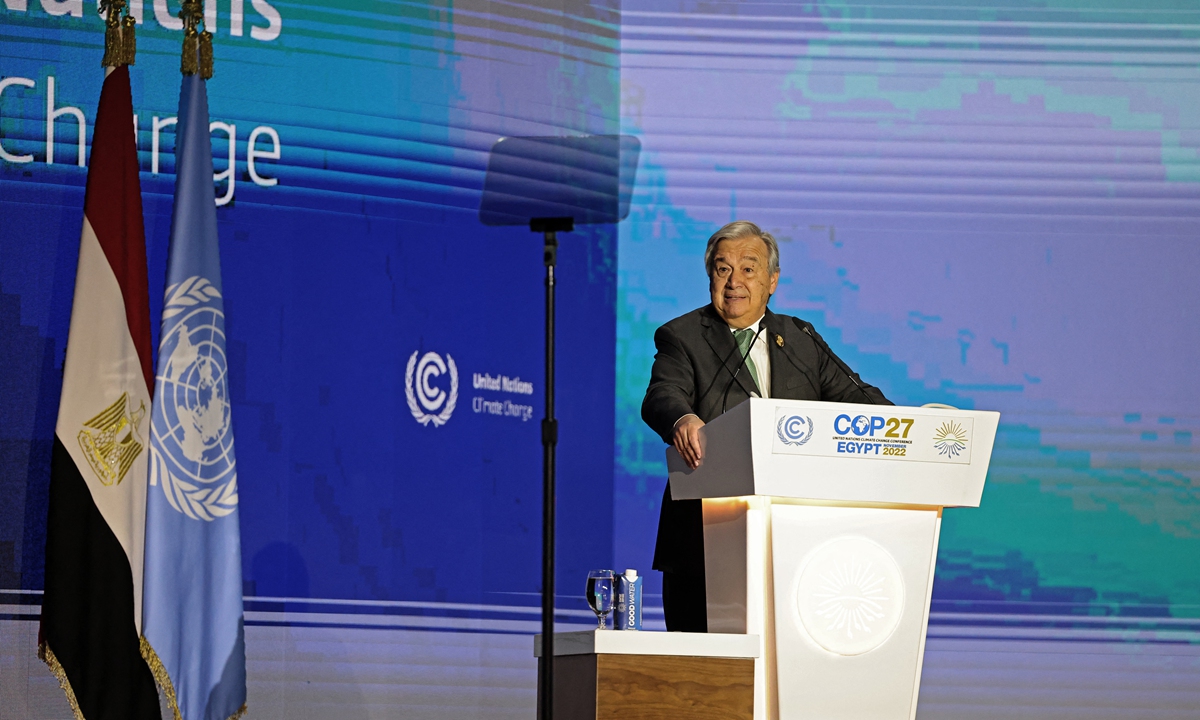Unity, action urged to tackle global climate crisis as experts warn against COP27 entangled in politics

United Nations Secretary General Antonio Guterres delivers a speech at the leaders summit of the COP27 climate conference at the Sharm El-Sheikh International Convention Center, in Egypt’s resort city of Sharm El-Sheikh, on November 7, 2022. Photo: AFP
This year's COP27, convened after a year under the shadow of climate disasters and an energy crisis, appeared to have made some breakthrough to include loss and damage compensation into talks, in response to developing nations' persistent demands, and perhaps offered a chance for leaders around the world to make efforts together and take concrete actions.
Yet, as delegates officially entered two weeks of negotiations, experts warned on Monday that as global efforts to tackle global warming are needed more than ever at this "watershed moment" on climate action, politicization and pointing fingers at others at the summit will only damage trust between countries and block joint efforts.
It is the US that has been taking politicization of the climate issue to a new level before the summit. With Washington sparing no effort to use this summit to shore up its leadership on climate issues, it is shifting blame onto China over climate issues and sowing discord between China and other developing countries. Observers said such behavior showed the US is jealous about China's popular role among developing countries in dealing with global warming and other climate issues.
Humanity is in "the fight of our lives" as climate change intensifies droughts, floods and heatwaves, UN Secretary General Antonio Guterres warned world leaders on Monday, at talks in Egypt on curbing global warming.
"Co-operate or perish," he told leaders at the COP27 summit in the Red Sea resort of Sharm el-Sheik. "It is either a climate solidarity pact, or a collective suicide pact," media reported.
Speaking at a side event at COP27 on Sunday, China's Special Envoy for Climate Change Xie Zhenhua introduced China's progress on climate change in recent years.
"China has actively implemented the Paris Agreement and further enhanced its nationally determined contribution, aiming to reach carbon peak and achieve carbon neutralization in a strong, orderly and effective manner. China has made great progress in this regard," said Xie.
"I hope the conference this time will meet the demands of developing countries as much as possible, as it is being held in Egypt, a developing nation," he said.
In addition to addressing unresolved issues from last year's COP26 summit in Glasgow, discussions about financing for and mechanisms to compensate the loss and damage caused by climate change are likely to be the main focuses at this year's COP summit, said Teng Fei, Deputy Director of the Energy Environment Economy Institute, Tsinghua University.
Delegates from nearly 200 countries kicked off the UN climate summit in Egypt on Sunday. Diplomats approved discussion on matters relating to "funding arrangements responding to loss and damage associated with the adverse effects of climate change, including a focus on addressing loss and damage."
The agenda item was proposed by Pakistan on behalf of the Group of 77 and China during inter-sessional work at Bonn, Germany, in June this year. It envisages compensating developing nations for mounting damage linked to climate change, media reported.
The loss and damage agenda, which comes in response to developing countries' concerns, is likely to be established during the summit and become a political legacy of COP27, Li Shuo, senior global policy advisor from Greenpeace East Asia, told the Global Times. However, he warned there will be an arduous journey before any final resolution is reached.
Convened after a year of devastating climate disasters and amid the ongoing Russia-Ukraine conflict, which has triggered an energy crisis that has stoked inflation and threatened food security, Li warned that this year's conference will be closely tied up with geopolitical factors, posing a challenge for COP27.
Speaking on the sidelines of the COP27 summit in Egypt, French President Emmanuel Macron said the US, China and other non-European rich nations must pay "their share" to help poorer nations deal with climate change, AFP reported.
"We need the United States and China to step up," Macron said, noting that "Europeans are paying. We are the only ones paying. Pressure must be put on rich non-European countries, telling them, 'you have to pay your fair share'."
Developed countries shoulder greater historical responsibility as they are overwhelmingly blamed for the catastrophe of global climate change, said Yang Fuqiang, a senior advisor on climate change and energy transition at the Energy Research Institute at Peking University. However, those countries are constantly making empty promises on financing developing countries in tackling global warming. "Those rich countries should first honor their own pledges before pointing fingers at others. They are not the only ones paying."
At the top of Egypt's "to-do" list is the $100 billion a year developed countries promised way back in 2009 to help the developing world cut emissions and adapt to changing climate, BBC reported, adding that the money was supposed to be delivered in 2020 but now won't be available in full until next year - three years late.
Experts said that handling global warming requires global cooperation, and pointing fingers and shifting blame will only harm the trust between countries, which will wreck global joint efforts in this field.
A political show
The US, however, could not miss the opportunity to elevate its politicization of the issue to another level. Despite making little progress on curtailing emissions on its own soil, and US facing the possibility of returning to climate denialism if Republicans gain a sweeping victory in midterm elections, the Biden administration is reportedly going all out to assert itself as a global leader on climate action at COP27.
Biden will arrive in Sharm El-Sheikh on November 11, shortly after the midterm elections. At the summit, the US seeks to challenge China's claim to global leadership and restore US credibility on climate action to counter China's courting of developing countries, US media outlet Politico reported.
The US tactic of throwing mud at China includes shifting the blame onto China for halted climate talks and pressuring it to pay, analysts said.
Washington has always served as the bulwark of wealthy countries' resistance to making such payments, but before the summit, it suddenly changed its tune, saying it was open to paying reparations to countries suffering the ravages of climate change — but only if China ponies up, too, according to Politico in another report.
China should contribute its own funds to the cause, US Special Envoy John Kerry told reporters late last month, "especially if they think they're going to continue to go on to the next 30 years with increasing their emissions," Politico reported.
In fact, it reflected Washington's sour grapes mentality after seeing that China's role on climate action is winning acclaim among developing countries and is expanding cooperation with them, said Yang. He explained that the US has a desire to assume leadership in every field, thus it seeks to make China look bad and sow discord between China and other developing countries.
However, the US attempt to assume leadership on climate action is doomed to fail, as the world has witnessed how the country failed to make concrete progress in tackling global warming and how fragile its commitment is when faced with political changes at home, said experts.
The US has inflicted more than $1.9 trillion in damage to other countries from the effects of its greenhouse gas emissions, the Guardian reported, citing a new analysis in July that provided the first measurement of nations' liability in stoking the climate crisis.
The huge volume of planet-heating gases pumped out by the US, the largest historical emitter, has caused such harm to other, mostly poor, countries through heatwaves, crop failures and other consequences, that the US is responsible for $1.91 trillion in lost global income since 1990, the Guardian reported, citing the study.
In comparison with the US resistance to offering money to ease developing countries' suffering due to climate issues, China has offered 1.1 billion yuan ($150 million) on South-South cooperation in climate change, offered energy-saving and new energy products to nearly 40 countries and trained 1,500 professionals on climate change for 120 developing countries, Wang Wenbin, spokesperson of China's Foreign Ministry, said last year.
Li Haidong, a professor from the Institute of International Relations at the China Foreign Affairs University in Beijing pointed out that US climate policy is again on the brink of seeing a flip-flop, as Republicans are positioned to regain control of the House of Representatives during midterm elections. The US pulled out of the Paris Agreement in 2017 under Republican president Donald Trump.
"A Republican-controlled House will greatly frustrate Biden's climate plans. Moreover, such a policy shift by the world's biggest emitter will deal a huge blow to global efforts to realize climate goals," said Li.

